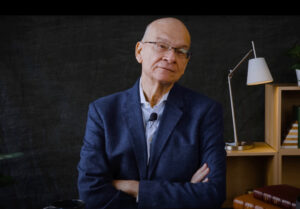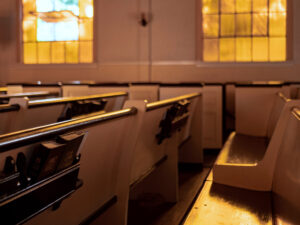Christians in the arts—theater, dance, music, etc.—face suspicion from both their colleagues and from their fellow Christians. Max McLean’s story is one of immersing himself in theater and finding a better way with the gospel, of both pursuing his calling and honoring his Lord.
Max McLean, tell us a little bit about yourself.
I am an actor, writer, theater—and now film—producer.
When I became a Christian in 1976, I felt convicted to bring my faith into my work. This eventually led to establishing an organization in 1992 called Fellowship of Performing Arts, which has been my life’s work. It’s a not-for-profit New York City-based production company producing theater and film from a Christian worldview. Presently, we have several tours of different shows performing across the country, and we’ve begun work on our second movie. Our first movie, The Most Reluctant Convert, came out in 2021, and has been seen in 137 countries.
I just recently moved from New York City to New Jersey where I live with my wife of 46 years, Sharon. I have two lovely daughters and 4 amazing grandchildren.
Sharon and I have been longtime members of Redeemer Presbyterian Church. Sharon was part of the diaconate and the Redeemer Counseling Center, and for several years I led the scripture reader’s ministry there.
Tell us how you came to be a Christian.
I grew up a nominal Catholic. Church was not a central part of our family life. My dad’s 28-year career in the U.S. Army took us all over the U.S., Europe and the Far East, and when I graduated from college, my dad was stationed in Giessen, West Germany. I decided to go to Giessen as a stepping stone to drama school in London. While there, I got a job as a forklift operator at the army base, which is where I met Sharon Joy Bush. She was teaching at the nearby American school.
Sharon invited me to attend church with her at a small, local English-speaking evangelical church made up of mostly American expats and GIs. I went reluctantly. I didn’t understand worship, and couldn’t follow the liturgy except for the Lord’s Prayer. After the service, Sharon introduced me to some of her friends. Like Sharon, they were smart, attractive, interesting people, and they asked me good questions that were probing, yet respectful. They didn’t push, but they also didn’t back away.
I thought Jesus was a fairytale, a story for children. God used that little comment to open my mind to the possibility that the narratives about Jesus that are preserved in the gospels really happened.
One discussion was particularly impactful: I let it be known that I was a history major in college, and one of Sharon’s friends commented that Jesus was a person in history. That was news to me. I thought Jesus was a fairytale, a story for children. God used that little comment to open my mind to the possibility that the narratives about Jesus that are preserved in the gospels really happened.
That prompted me to read John’s Gospel. I had tried to read it before, but this time it was different. I read it in one sitting, which took about two hours. My imagination was completely engaged. I thought Jesus was going to jump off the page. This was no meek and mild Jesus. This was a heroic Jesus. The hero by which all other heroes and superheroes are but a copy. As I read his life, his miracles, the unjust trial and crucifixion, and how he faced it, I was in tears. An innocent man was unjustly condemned—the worst possible thing was happening to the best possible person. The resurrection story was the most cathartic experience I’d ever had. I could see that the creator of Heaven and Earth had come to earth in the person of Jesus Christ, for my benefit, for my salvation. He was willing to pay the price for my salvation, because He loved me. As in 2 Corinthians 5:17, I was literally a new creation. From that moment, God began to work in my life and convict me of my sin.
How did becoming a Christian affect your work?
We moved to London, where I intended to continue my theater training while Sharon taught at an American school there. In London, I was exposed to some of the best theater in the world; I saw fantastic productions.
It was there that the seed for my life’s work took root. Theater and storytelling are compelling ways to convey truth. The gospel of Jesus Christ is the most important story to convey. I found myself asking the question, “Why isn’t art and theater of this caliber being produced from a Christian worldview?”

We moved to New York City, where I immersed myself into the theater scene while working as an actor. However, I realized that my job was to communicate other people’s ideas, which I found unfulfilling. At the same time, God was calling me closer to Himself, and I felt led to explore using drama in a ministry capacity.
I studied the Bible more closely and attended seminary classes. At that time, drama in the church was starting to get some attention, but it was mostly sketches to illustrate sermons, which didn’t motivate me. Rather, the Lord inspired me to do something different, encouraging me to use the skills and techniques I developed from acting and the theater to illuminate great literature and bring all that together to initiate theatrical presentations of the Bible.
Well, it was an event waiting to happen. From the first time I presented the Bible in this way the impact was immediate and profound. Instead of using the gospel stories as source material for prescriptive teaching, it became a script for theater. That is a more cellular, visceral, less cognitive experience. Soon I found myself on the road about 150 nights a year performing memorized presentations of Mark, Acts, Genesis and Philippians in churches, conferences and colleges around the country.
Those early college presentations plus a small group of patrons who believed in what I was doing prompted the organization of Fellowship for Performing Arts as a non-profit ministry. It is now and has always been a fellowship of people who believed that art and theater from a Christian worldview would engage the imagination and influence culture.
What role do you think FPA has played with integrating arts into the Christian space?
Creating a legitimate, professional theater company in NYC is a challenge. Making it known that our creative foundation is rooted within the Christian ethos raises eyebrows, and increases the challenge exponentially. Attempting to accomplish this mission in a way that speaks to a culturally diverse audience in a politically polarized, borderline-hostile environment is near impossible. But yet, that’s exactly what FPA is accomplishing.
FPA is accomplishing it on college campuses as well, which is another challenging frontier. We bring shows and the Reluctant Convert film to universities such as Princeton, Duke, and Brown, with the goal of exposing young adults to C.S. Lewis and other influential Christians. The story of C.S. Lewis’ journey to faith during extremely formative years in a person’s life is impactful. These students are in those years and face a lot of the same big questions the productions and film address, and the shows have sparked many conversations. FPA leaves behind discussion guides to help campus pastors and campus ministries continue those conversations. The stories presented in the FPA productions linger with students long after the show has packed up and moved on.
I agree with the words of theatrical writer & director, Paul Johnson, “Those who want to influence men’s minds have long known that the theater is the most powerful medium with which to make the attempt.”
But what really motivates me is my favorite Bible verse, Ephesians 2:10: “We are created in Christ Jesus to do good works which were prepared in advance for us to do.”




